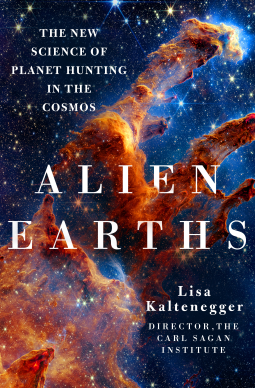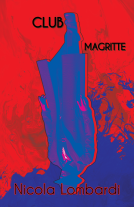
Alien Earths
The New Science of Planet Hunting in the Cosmos
by Dr. Lisa Kaltenegger
This title was previously available on NetGalley and is now archived.
Send NetGalley books directly to your Kindle or Kindle app
1
To read on a Kindle or Kindle app, please add kindle@netgalley.com as an approved email address to receive files in your Amazon account. Click here for step-by-step instructions.
2
Also find your Kindle email address within your Amazon account, and enter it here.
Pub Date Apr 16 2024 | Archive Date Apr 30 2024
Description
"Kaltenegger's breezy narrative style invites you to experience with her the challenges and joys of being a scientist on the frontier of discovery." —Neil deGrasse Tyson, Astrophysicist, American Museum of Natural History
"Horizon-expanding... [Kaltenegger] has something of Sagan’s knack for eliciting wonder." —The Times
"A superb testament to the scientific virtue of curious wonder." —Wall Street Journal
For thousands of years, humans have wondered whether we're alone in the cosmos. Now, for the first time, we have the technology to investigate. But once you look for life elsewhere, you realize it is not so simple. How do you find it over cosmic distances? What actually is life?
As founding director of Cornell University's Carl Sagan Institute, astrophysicist Lisa Kaltenegger has built a team of tenacious scientists from many disciplines to create a specialized toolkit to find life on faraway worlds. In Alien Earths, she demonstrates how we can use our homeworld as a Rosetta Stone, creatively analyzing Earth's history and its astonishing biosphere to inform this search. With infectious enthusiasm, she takes us on an eye-opening journey to the most unusual exoplanets that have shaken our worldview - planets covered in oceans of lava, lonely wanderers lost in space, and others with more than one sun in their sky! And the best contenders for Alien Earths. We also see the imagined worlds of science fiction and how close they come to reality.
With the James Webb Space Telescope and Dr. Kaltenegger’s pioneering work, she shows that we live in an incredible new epoch of exploration. As our witty and knowledgeable tour guide, Dr. Kaltenegger shows how we discover not merely new continents, like the explorers of old, but whole new worlds circling other stars and how we could spot life there. Worlds from where aliens may even be gazing back at us. What if we're not alone?
Available Editions
| EDITION | Other Format |
| ISBN | 9781250283634 |
| PRICE | $30.00 (USD) |
| PAGES | 288 |
Available on NetGalley
Average rating from 83 members
Featured Reviews
 Reviewer 186721
Reviewer 186721
I loved this book for the perspective it gave on why space exploration is important.
The context o understand space exploration is not always clear. This is changing with times as our requirements for a safe earth change. Long ago it was this letter to a nun. https://news.lettersofnote.com/p/why-explore-space
This is a very accessible read. Made me look at how light can reveal so many secrets of where its been.. why JWST needs to have big mirrors.
What is an alien? How astrobiology can help us learn more. How DNA has been advanced from 4 base letters to 8 understand more.
I cant eat an apple now without thinking of our earth.
For a peek into the mysteries of space and the increasing relevance of our relation with space, read this book. I am excited about all we are going to learn from the planned launches to TItan, Jupiter moons in the coming years 2034, 2037....
Happy Orionids Viewing..
Time to get your space calendar out.. I say...
It’s one big mystery: life on other planets. Lisa Kaltenegger gives us a fascinating and comprehensible look at unexpected discoveries in the universe. For anyone that thinks this is a “stuffy and rigid” subject, she will prove you wrong with all sorts of ways astronomers are exploring new planets with advanced technology.
She explained how Earth has changed from a billion years ago. Kaltenegger makes comparisons that are simple to understand. Who would have ever thought about raisin bread and the big bang explosion? She said at first the raisins are close together. Then when dough rises, the raisins spread out just like the stars in the universe. This made me smile.
This book engages readers to learn and understand more about Earth, Jupiter, Saturn, the Moon and Sun along with other surrounding planets outside of our solar system. She answers questions like: What is the meaning of tardigrades on the moon? How does one search for life in the cosmos? What is the significance of posters at an international collaboration with scientists? Why is it impossible for humans to live on almost all other planets?
Kaltenegger talks about her work as the Director at the Carl Sagan Institute at Cornell. She says it wasn’t easy as a female to advance with this type of career. However, at 46 years old, her accomplishments are impressive. She hopes that someday there will be a way of space traveling safely to areas where we can only dream about now.
This is an easy-to-read, interesting book. The only thing missing is the visual look at what she’s describing which is why she has a big following at live presentations. I love her comments about science fiction books and movies. While there hasn’t been proof yet of other types of life, she notes that with 200 billion stars in our galaxy, it’s just a matter of time when it happens.
My thanks to St. Martin’s Press and NetGalley for providing me with an advanced copy of this book with an expected release date of April 16, 2024.
Interesting but also not particularly simple or simplistic. There are things that no matter how easy you try to explain are not easy at all, and on this I must say the author does a very good job.
Planets, stars and possible life outside of our planet is something we have only just begun to study and there is still a long way to go, but you certainly cannot say it is not a fascinating path.
Interessante ma anche non particolarmente semplice o semplicistico. Ci sono cose che per quanto si provi a spiegare facilmente non sono facili per niente e su questo devo dire che l'autrice fa un ottimo lavoro.
I pianeti, le stelle e l'eventuale vita al di fuori del nostro pianeta é qualcosa che abbiamo appena cominciato a studiare e la strada é ancora lunga, ma certo non si puó dire che non sia un percorso affascinante.
I received from the Publisher a complimentary digital advanced review copy of the book in exchange for a honest review.
What a dream it would be to work at the Carl Sagan Institute. Dr. Kaltenegger offers glimpses into her life and career in astrophysics and research in studying plantary outerspace, and her lifelong enthusiasm and fascination for this exploration comes across very clearly. I liked when she provided a framework for the science by relaying how her students talked about it, because it felt like she made for a terrific professor. I would have liked the book to be a little more accessible to the layperson, and a little more organized thematically, but even Carl Sagan enthusiasts can only aspire to be such an infectious and illuminating storyteller as he was. Anyone who's even tangentially related to his work is remarkable, and such is the case with Dr. Kaltenegger. Try not to be disappointed when you leave this book not knowing the answer to whether we've found extraterrestrial life out there!
Very science heavy, but still an interesting read. A different genre than I normally read, but it was still accessible to me in the best way.
 Mary S, Reviewer
Mary S, Reviewer
Excellent and lucid review of the search for life on other planets. This is not an area that I was particularly interested in but the writing is so lively and she uses so many metaphors and analogies to make it understandable that I’m really glad Net Galley gave me an ARC in exchange for my independent review here.
In the last 20-30 years there has been so much progress in identifying the many possible places close to us in the universe where life of some sort might exist. The techniques astronomers use are very ingenious and as I said she makes it seem so logical. It turns out that astronomers are very interested in science fiction because their own research requires that they use their imaginations in such creative ways. This book has not succeeded in making me a sci-fi fan however. I’m more interested in facts. I was also not aware of just how interdisciplinary and international this field is. An appendix gives a lot of resources for citizen scientists to learn more and get involved.
I will definitely be paying more attention to this field in the future. Thank you NetGalley!
 Anna O, Reviewer
Anna O, Reviewer
A fascinating, informative and fairly easy to understand look at the universe and our place in it. The author had a great writing style easy to grasp even when she was talking about some of the heavy science topics.
 Debbie-jean L, Reviewer
Debbie-jean L, Reviewer
"Alien Earths" by Dr. Lisa Kaltenegger is a captivating exploration of the possibility of extraterrestrial life and the potential habitability of exoplanets. Kaltenegger, an astrophysicist at the forefront of exoplanet research, provides a compelling synthesis of scientific discovery and speculative wonder. The book delves into the latest advancements in exoplanet detection and characterization, presenting a vivid picture of the diverse worlds scattered throughout the cosmos.
Kaltenegger's accessible prose skillfully navigates complex concepts, making this work appealing to both enthusiasts and those new to astrobiology. She seamlessly weaves together astrophysics, biology, and the quest for life beyond our solar system. Through engaging storytelling and rich scientific detail, "Alien Earths" invites readers to ponder the profound question of whether we are alone in the universe.
In an era of rapidly evolving space exploration, Kaltenegger's work serves as a timely and enlightening guide to the tantalizing prospect of discovering habitable exoplanets and potential extraterrestrial life. "Alien Earths" is an essential read for anyone intrigued by the mysteries of the cosmos and the search for life beyond our home planet.
 Anna L, Librarian
Anna L, Librarian
Remember how, in so many Sci-fi movies, in a blink of an eye, spacecraft traveled faster than the speed of light? Could what we deem Sci-fi be reality in today’s world? Author Lisa Kaltenegger, Director of the Carl Sagan Institute to Search for Life in the Cosmos at Cornell and Associate Professor in Astronomy, was presented with a suggestion from one of her students dealing with just that. Maybe the reason why we don’t have many alien visitors might be because the distances between habitable worlds are too vast to be travelled. Although traveling in this manner is beyond us currently, communicating with an alien species by collecting radio signals may be possible. You may recall the movie, “Contact”, based on a novel by Carl Sagan and his wife Ann Druyan. Thousands of exoplanets (planets around suns other than ours) have been found but which of these host life? If we were to find that we could communicate with another civilization, what would we say to them? Obviously, they would not speak any of the thousands of languages spoken here on Earth but perhaps we could learn a thing or two from the many scientists worldwide who study communication of species such as dolphins, chimpanzees, dogs, etc. about communicating. Keltenegger discusses interesting topics about the makeup of habitable worlds, what makes up life, searching for life in the Cosmos, and why. Don’t we all want to know if there is life (perhaps like us) somewhere else in the Universe? If not, put your head back in the ground.
Alien Ears by Dr. Lisa Kaltenegger is an excellent and informative non fiction read on a topic that is incredibly present in the current cultural zeitgeist..
This will be a good read for those interested in the topic of life supporting planets outside of our solar system looking for a great deal of information in a digestible format.
This book was very interesting. Dr. Kaltenegger wrote in a way that made complex science topics approachable and understandable
The book discusses the conditions that lead to life on this planet as well as what scientists are looking for when they look for life on other planets. It was very interesting to learn about how our research of the cosmos has truly turned into a multidisciplinary effort. She also discussed the difficulties women experience when working in the field of science.
The only thing that was missing from this book was some pictures and diagrams.
I was provided an ARC in exchange for my honest feedback.
 Lillian C, Reviewer
Lillian C, Reviewer
Are we really alone? This book makes you think about how far we have come with space exploration. Is there alien life out? So many questions to the unknown. Interesting read about what is out there makes you think that there could be another life form out there.
It doesn't matter what you believe as this book gives you a glimpse into the unknown. Lisa writes a good solid book that made me think about what could be out there.
Thank you Netgalley & the publisher for the copy. This is my voluntary review.
I loved this book. Dr. Kaltenegger took a fascinating area of astronomy and brought it down to Earth with her conversational tone, great explanations of the science, and joyous enthusiasm. I loved reading about her own journey. There was also a good bit of information about the process of science and uniquely in my experience, the book discusses the role of scientific meetings, oral presentations, and posters, albeit briefly. And all of this is done with a good deal of humour. Even though I had already read books on the topic, this book is outstanding in that it made everything seem brand new. Thank you to Netgalley and St. Martin's Press for the advance reader copy.
Readers who liked this book also liked:
Yuzuru Kuki
Biographies & Memoirs, Children's Nonfiction, Comics, Graphic Novels, Manga
JUNO
Arts & Photography, Comics, Graphic Novels, Manga, Travel
Silvia Moreno-Garcia
Historical Fiction, Literary Fiction, Sci Fi & Fantasy
Sam Prentice-Jones
Comics, Graphic Novels, Manga, Sci Fi & Fantasy, Teens & YA


















